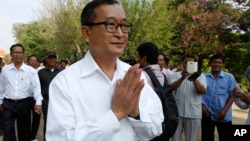The Ministry of Justice has rejected a proposal by Cambodia’s opposition leader, Sam Rainsy, that he testify before court via Skype.
Sam Rainsy is in exile abroad, facing a jail sentence if he returns to Cambodia, but he is facing more charges still, in a defamation case brought by the president of the ruling Cambodian People’s Party, Heng Samrin.
He was expected in court on Monday. A Justice official told VOA Khmer that Cambodia has no law or procedures that would allow for remote testimony, but Sok Sam Oeun, a legal expert at the Cambodian Defenders Project, said such a procedure is not unheard of in developed countries.
Heng Samrin brought the suit against Sam Rainsy after he posted on his Facebook page a video of the late King Norodom Sihanouk criticizing Heng Samrin as a puppet of Vietnam.
Sam Rainsy said on his Facebook page on Saturday he would answer questions from the court via Skype—“a communication tool of the Internet, which is consistent with the fact that I am accused of defaming Mr. Heng Samrin on the Internet, as well.”
Ministry of Justice spokesman Chin Malin told VOA Khmer Monday that a Skype appearance would be “impossible,” because Cambodia’s judiciary lacks the proper procedures and protocols. The law states that a person summoned must “show up in court,” he said. “Therefore it is clear that all summoned persons must show up before the prosecutor or investigating judge.”
That’s because judges need to verify the identity of a person and they need to be able to observe their behavior before deciding how to proceed with a case.
“So in this case, it is a criminal policy, [court officials] rarely use online communications and satellite systems, because it is difficult to make a judgment for the real identity, and also it is difficult to judge the accused person’s mindset and to ask follow up questions,” he said.
Chin Malin said authorities will likely issue an arrest warrant for Sam Rainsy’s failure to appear to his Jan. 4 summons.
However, Sok Sam Oeun said court officials can do all the same work via Skype, particularly in a case of defamation, which is not serious.
“If it is not criminal a case, like murder, it would be OK,” he said. “We don’t need to force defendants to appear in court, and it’s just a complaint…that doesn’t carry a jail term.”
In the US, for example, witnesses have appeared via Skype, which is different from telephonic communication, in that it allows the speaker to be seen.
Meanwhile, Sam Rainsy remains abroad, facing a two-year jail sentence in a criminal defamation case brought by Foreign Minister Hor Namhong, over comments Sam Rainsy made in a 2008 speech, accusing the minister of collusion with the Khmer Rouge.
A final ruling in that case only came in 2015, after political divisions grew between the ruling Cambodian People’s Party and Sam Rainsy’s Cambodia National Rescue Party, which made major gains in the 2013 elections.







